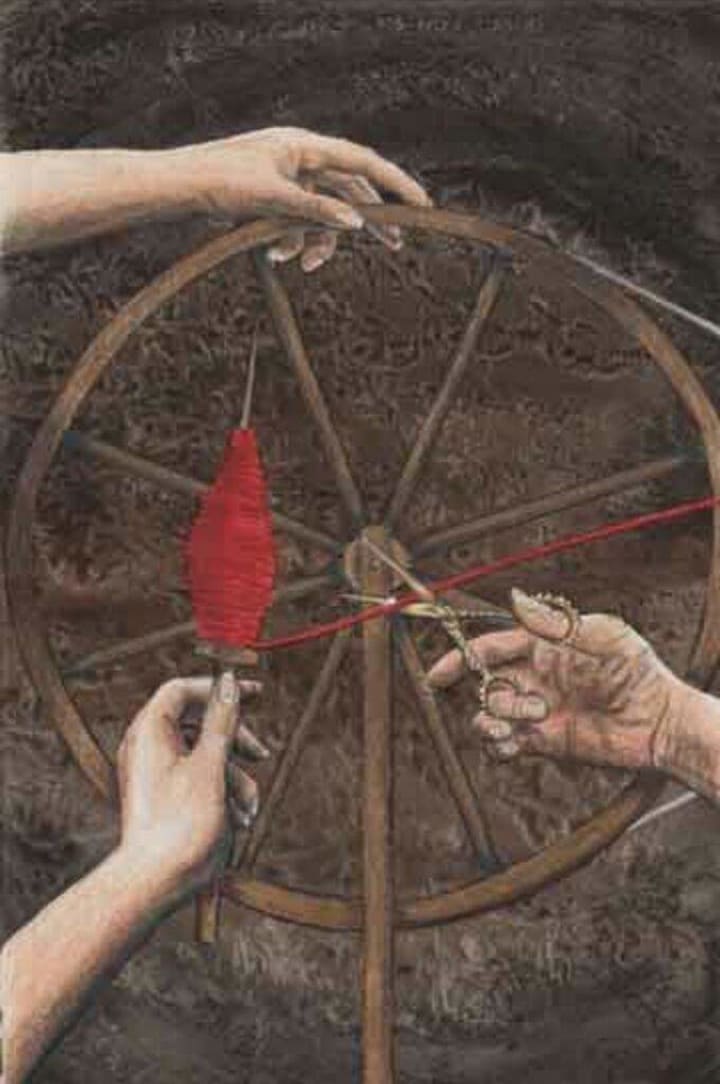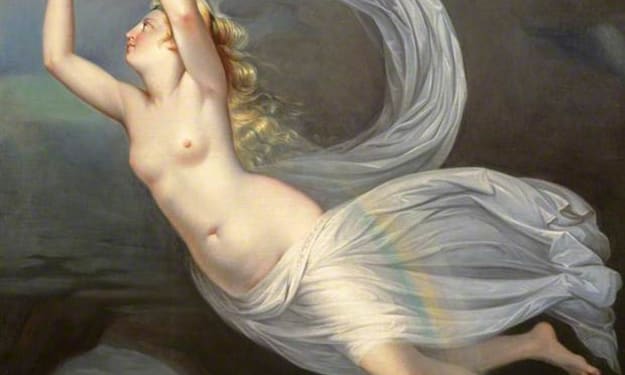Ways of Worship: The Fates
Hellenic Witch/Wiccan Worship of The Fates

General Information:
The Fates, otherwise known as the Moirai, are three sisters who personify destiny and fate. They are often depicted as crazy old crones with one eye that they share between them. Each sister has a role to play in how a persons destiny is spun. Klotho is the spinner, or the one who weaves the yarn that represents ones entire life as well as their fate. Lachesis is the allotter, she measures the yarn and some say she is the one who truly controls a persons destiny. She ensures that someone's destiny runs as it should, as long as it should. Atropos is the last sister and she is the cutter. She represents death as she cuts the yarn when it is time for the person to die. Once the thread is cut the person meets their end.
There are many different lores about their parentage. In some lore their parents are Chronos, the titan of Time, and Ananke the personification of inevitability. This makes them the half sisters to the original 6 Gods. In another myth they where sired from Uranus, the primordial titan of the sky, with no known mother. Nyx was also said to have been responsible for their creation along with most other non-primordial personification gods. The last known claim to parentage for the sisters are Zeus and his second wife Themis, the personification of justice and titaness daughter of Gaia.
The Fates are often seen as impartial beings who represent universal order. They control the destiny of Gods, monsters, and mortals alike. However, in some stories Zeus can command the sisters to do his bidding but cannot reverse any decision they make. Their Roman equivalent is the Parcae. Klotho's Roman name is Nona, Lachesis' Roman name is Decima, and Atropos' Roman name is Morta.
While the Fates are not often portrayed in any myths, instead being said to only attend births and deaths or being given smaller roles, there are two exceptions to that. The Fates first spoke to a mortal woman named Althaea who had given birth to a son Meleager. The Fates told her that her son would live a very long life as long as a log that sat on the hearth was unburned. She immediately hid the log in a box until Meleager had grown up and murdered his uncles due to a dispute over a boar skin. In the throws of greif Althaea threw the log onto the fire. When it burned fully Meleager died and in a fit of remorse Althaea killed herself.
The only other myth they where really featured in was one that featured the trickster Apollo. Apollo had learned that his favorite mortal king Admetus was destined to die. Apollo took it upon himself to stop this from happening and approached the Fates. He brought offerings of alcohol and shared it with them, faking drinking as they in turn became very drunk. Apollo then tried taking advantage of their imebriated state to convince them to spare Admetus, which they agreed to on the condition that he find a substitute. Apollo was unable to find one in time and things looked dire for Admetus, however at his last minute Queen Alcestis, Admetus's wife, stepped forward and volunteered her life in exchange for her husbands.
Altar, Offerings, and Symbols

General Symbols: The Book of Fate, iron shears/scissors, thread, spindle, staff, scroll, loom
Gems/Crystals: Destiny stones, aventurine, tigers eye
Animals: Dove, spider
Plants: Blackthorn, Camellia
Scents: Fire, old books, antique or oiled wood
Colours: Red, white, black, gold
Food: Red wine, grains, any fruits but specifically berries and apples, honey
Prayers and Invocations

Things to Pray for: extra time, change of fortune, guidance, bargain for someone's fate
Prayer
I praise the Fates, careful crafters of destiny,
daughters of Night, daughters of Necessity,
sparing ones, kind-hearted ones, relentless ones,
goddesses who grant to each one his portion,
mighty ones who hold in hand each mortal life,
a thread spun smooth and fine as a spider’s web.
What is right, what is meet, is yours, O Moirae;
the power of Fate is the power of need,
the power of concord, the power of order.
The power of Fate is the power of death,
the power of life, each allotted as is fit.
Clotho, Lachesis, Atropos, goddesses wise
and ancient, who sing of what is, what was,
and of what will be, long-revered ones who in times
of old received libations of sweet honey,
I honor your calling, I thank you for your gifts.
Prayer #2/ Song
I swear, as long as I live,
To love you, O Sylvie;
Fates, who in your hands holds
The thread of our Life,
Elongate mine, as long as you can,
I beg you.
About the Creator
Lilli Behom
I have no idea what I'm doing but I'm always down for spooks.






Comments
There are no comments for this story
Be the first to respond and start the conversation.